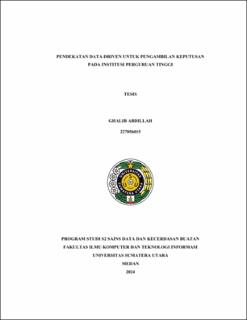| dc.description.abstract | Data-driven approaches, which leverage data for various purposes, are increasingly
adopted by organizations, including higher education institutions. These
approaches focus on thorough data analysis, interpretation, transformation, and
presentation to inform organizational decision-making. However, higher education
institutions often face obstacles such as outdated technology infrastructures, rigid
governance structures, and susceptibility to ongoing regulatory changes, which can
impede the support needed for managerial decision making. This research addresses
the gap by proposing a data-driven methodology to enhance decision-making
processes within the academic domain of higher education institutions, utilizing
various data preprocessing techniques and machine learning algorithms to integrate,
to enhance data quality and to analyze data from multiple systems within a
university environment. Three clustering models were developed: Model A
(demographic attributes), Model B (academic performance attributes), and Model
C (a combination of both). Results indicate that socio-demographic attributes
negatively impact clustering cohesion, with Model B achieving the highest
performance with a silhouette score of 0.56. The findings demonstrate the potential
of a data-driven approach to provide comprehensive information that aids
university leaders in policy-making, ultimately improving institutional quality and
competitiveness. | en_US |


